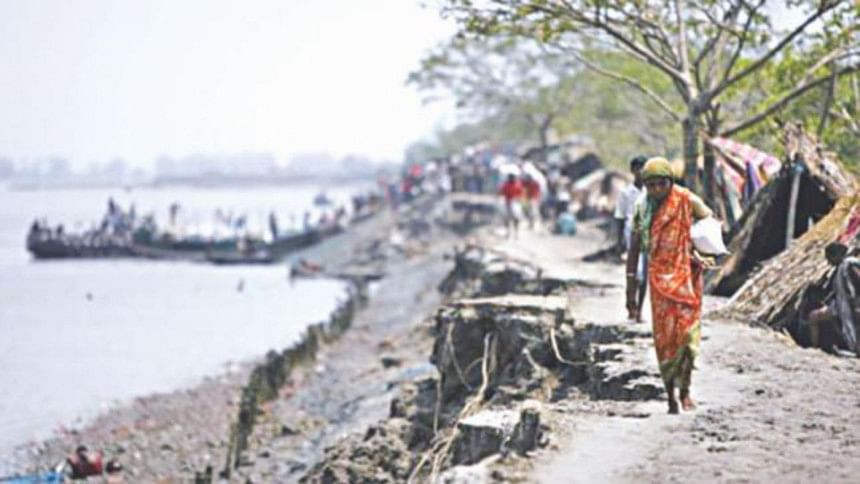Fighting climate change, building resilience

As the cyclone Fani approached the Bangladeshi coast last month, many were reminded of the horrors that previous super cyclones left in their wake. In 1970, a cyclone of similar intensity killed half a million people. Since then, significant strides have been made in planning and preparedness that have resulted in greatly reduced losses from cyclones. This time, when Fani intensified, the government of Bangladesh and civil society partners immediately evacuated 1.6 million people to safety—a feat of remarkable coordination that makes Bangladesh a study in disaster preparedness.
This level of preparedness was not achieved in a day.
Due to its geography, Bangladesh has always been vulnerable to climate change and natural disasters. Climate change adaptation and environment have been a prime focus of the tripartite partnership between the government of Bangladesh, UNDP and Sweden. Over the years, we are proud to have supported the government in a range of efforts that helped Bangladesh better cope with disasters, from expanding the number of cyclone shelters along the coast to developing an effective disaster management policy.
There is little doubt that Bangladesh has gone through considerable development. The economy has been growing at a steady pace and in the past two decades the number of people living in poverty has been halved. Moreover, girls now outnumber boys in primary and secondary education and remarkable progress on health indicators has been achieved.
Bangladesh faces daunting problems too. To name a few, there are still persistent inequalities in income and gender, pockets of poverty and unemployment as well as challenges of building a robust democracy with full enjoyment of human rights. At the same time, climate change and the rising frequency of natural disasters threaten to undo the country's social and economic progress and may cause millions to slide back into poverty.
In this context, the poor and the excluded are central to the challenge of achieving the Sustainable Development Goals, not least through helping them withstand effects of climate change.
Over the past two decades, UNDP and Sweden have time and again demonstrated a joint commitment to support Bangladesh in its efforts to build resilience against the impacts of a changing climate, addressing the protection of millions who live along the country's vulnerable coasts and other exposed areas.
Through the flagship Comprehensive Disaster Management Programme (CDMP) from 2010-2015, a joint initiative of the government of Bangladesh and other development partners, UNDP and Sweden worked together to reduce disaster risk vulnerability and institutionalised risk reduction in Bangladesh. Thanks to a new joint initiative with the European Union, 17,000 Bangladeshi households are now also on their way to becoming agents of change through the Local Government Initiatives on Climate Change (LoGIC).
Traditional gender roles still prevail in Bangladesh, with women performing the brunt of the housework. Many are tied to their homes and families, which means that they are often left behind during crises. These women and girls are the most vulnerable to climate change, and the lack of female leadership in local disaster management has been an obstacle. We are working to find solutions to these problems, bringing women into the frontlines of climate change adaptation and disaster management.
As advocates of human rights and equality, we hold that full and equal enjoyment is absolutely essential for a life in dignity and security. Likewise, the rule of law and accountable institutions are cornerstones of a well-functioning democracy. Thus, we work closely with the National Human Rights Commission (NHRC) in generating dialogue on the strengthening of democracy and gender equality as well as full and equal respect for human rights. We support the Commission's efforts to connect with other human rights organisations and citizens alike. Our joint efforts also aim to enhance the capacity of public institutions to combat violence against women, and we advocate more broadly to bring women and young people to the forefront of all developments.
Nearly one million Rohingya refugees live in camps in Cox's Bazar. Since hundreds of thousands fled their homes in 2017, we have been working with the government to strengthen local capacity to prevent crises, focusing on the most vulnerable including women and children. Our efforts to establish a sustainable system for solid waste management, and thereby reducing public health risks while protecting the environment for refugees as well as host communities, is a case in point. Time is of the essence, however. The needs of both refugees and host communities must be urgently addressed, and the respect for human rights protected and promoted.
Gradual poverty reduction and improving trends when it comes to gender equality and education for the children of Bangladesh are promising developments for the country. Sweden and UNDP will remain partners to Bangladesh's future sustainable growth and democratic development, standing with the people in their aspirations.
Charlotta Schlyter is Swedish Ambassador to Bangladesh and Sudipto Mukerjee is Resident Representative, UNDP.
Follow The Daily Star Opinion on Facebook for the latest opinions, commentaries and analyses by experts and professionals.
To contribute your article or letter to The Daily Star Opinion, see our guidelines for submission.

 For all latest news, follow The Daily Star's Google News channel.
For all latest news, follow The Daily Star's Google News channel. 



Comments